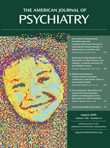Prefrontal Activation Deficits During Episodic Memory in Schizophrenia
Abstract
Objective: Episodic memory impairments represent a core deficit in schizophrenia that severely limits patients’ functional outcome. This quantitative meta-analysis of functional imaging studies of episodic encoding and retrieval tests the prediction that these deficits are most consistently associated with dysfunction in the prefrontal cortex. Method: Activation likelihood estimation (ALE) was used to perform a quantitative meta-analysis of functional imaging studies that contrasted patients with schizophrenia and healthy volunteers during episodic encoding and retrieval. From a pool of 36 potential studies, 18 whole-brain studies in standard space that included a healthy comparison sample and low-level baseline contrast were selected. Results: As predicted, patients showed less prefrontal activation than comparison subjects in the frontal pole, dorsolateral and ventrolateral prefrontal cortex during encoding, and the dorsolateral prefrontal cortex and ventrolateral prefrontal cortex during retrieval. The ventrolateral prefrontal cortex encoding deficits were not present in studies that provided patients with encoding strategies, but dorsolateral prefrontal cortex deficits remained and were not secondary to group performance differences. The only medial temporal lobe finding was relatively greater patient versus comparison subject activation in the parahippocampal gyrus during encoding and retrieval. Conclusions: The finding of prominent prefrontal dysfunction suggests that cognitive control deficits strongly contribute to episodic memory impairment in schizophrenia. Memory rehabilitation approaches developed for patients with frontal lobe lesions and pharmacotherapy approaches designed to improve prefrontal cortex function may therefore hold special promise for remediating memory deficits in patients with schizophrenia.



